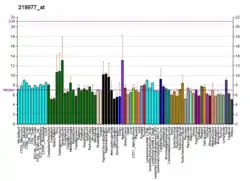AIPL1
Aryl-hydrocarbon-interacting protein-like 1 is a protein that in humans is encoded by the AIPL1 gene.[5][6][7][8]
Function
Leber congenital amaurosis (LCA) accounts for at least 5% of all inherited retinal disease and is the most severe inherited retinopathy with the earliest age of onset. Individuals affected with LCA are diagnosed at birth or in the first few months of life with severely impaired vision or blindness, nystagmus and an abnormal or flat electroretinogram. The photoreceptor/pineal -expressed gene, AIPL1, encoding aryl-hydrocarbon interacting protein-like 1, was mapped within the LCA4 candidate region. The protein contains three tetratricopeptide motifs, consistent with nuclear transport or chaperone activity. AIPL1 mutations may cause approximately 20% of recessive LCA.[8]
References
- GRCh38: Ensembl release 89: ENSG00000129221 - Ensembl, May 2017
- GRCm38: Ensembl release 89: ENSMUSG00000040554 - Ensembl, May 2017
- "Human PubMed Reference:". National Center for Biotechnology Information, U.S. National Library of Medicine.
- "Mouse PubMed Reference:". National Center for Biotechnology Information, U.S. National Library of Medicine.
- Sohocki MM, Bowne SJ, Sullivan LS, Blackshaw S, Cepko CL, Payne AM, Bhattacharya SS, Khaliq S, Qasim Mehdi S, Birch DG, Harrison WR, Elder FF, Heckenlively JR, Daiger SP (Feb 2000). "Mutations in a new photoreceptor-pineal gene on 17p cause Leber congenital amaurosis". Nat. Genet. 24 (1): 79–83. doi:10.1038/71732. PMC 2581448. PMID 10615133.
- Ramamurthy V, Roberts M, van den Akker F, Niemi G, Reh TA, Hurley JB (Oct 2003). "AIPL1, a protein implicated in Leber's congenital amaurosis, interacts with and aids in processing of farnesylated proteins". Proc. Natl. Acad. Sci. U.S.A. 100 (22): 12630–5. doi:10.1073/pnas.2134194100. PMC 240669. PMID 14555765.
- Liu X, Bulgakov OV, Wen XH, Woodruff ML, Pawlyk B, Yang J, Fain GL, Sandberg MA, Makino CL, Li T (Sep 2004). "AIPL1, the protein that is defective in Leber congenital amaurosis, is essential for the biosynthesis of retinal rod cGMP phosphodiesterase". Proc. Natl. Acad. Sci. U.S.A. 101 (38): 13903–8. doi:10.1073/pnas.0405160101. PMC 518851. PMID 15365173.
- "Entrez Gene: AIPL1 aryl hydrocarbon receptor interacting protein-like 1".
- Akey DT, Zhu X, Dyer M, Li A, Sorensen A, Blackshaw S, Fukuda-Kamitani T, Daiger SP, Craft CM, Kamitani T, Sohocki MM (Oct 2002). "The inherited blindness associated protein AIPL1 interacts with the cell cycle regulator protein NUB1". Hum. Mol. Genet. 11 (22): 2723–33. doi:10.1093/hmg/11.22.2723. PMC 2585502. PMID 12374762.
Further reading
- Bonaldo MF, Lennon G, Soares MB (1996). "Normalization and subtraction: two approaches to facilitate gene discovery". Genome Res. 6 (9): 791–806. doi:10.1101/gr.6.9.791. PMID 8889548.
- Sohocki MM, Malone KA, Sullivan LS, Daiger SP (1999). "Localization of retina/pineal-expressed sequences: identification of novel candidate genes for inherited retinal disorders". Genomics. 58 (1): 29–33. doi:10.1006/geno.1999.5810. PMID 10331942.
- Damji KF, Sohocki MM, Khan R, Gupta SK, Rahim M, Loyer M, Hussein N, Karim N, Ladak SS, Jamal A, Bulman D, Koenekoop RK (2001). "Leber's congenital amaurosis with anterior keratoconus in Pakistani families is caused by the Trp278X mutation in the AIPL1 gene on 17p". Can. J. Ophthalmol. 36 (5): 252–9. doi:10.1016/s0008-4182(01)80018-1. PMID 11548141.
- van der Spuy J, Chapple JP, Clark BJ, Luthert PJ, Sethi CS, Cheetham ME (2002). "The Leber congenital amaurosis gene product AIPL1 is localized exclusively in rod photoreceptors of the adult human retina". Hum. Mol. Genet. 11 (7): 823–31. doi:10.1093/hmg/11.7.823. PMID 11929855.
- Akey DT, Zhu X, Dyer M, Li A, Sorensen A, Blackshaw S, Fukuda-Kamitani T, Daiger SP, Craft CM, Kamitani T, Sohocki MM (2002). "The inherited blindness associated protein AIPL1 interacts with the cell cycle regulator protein NUB1". Hum. Mol. Genet. 11 (22): 2723–33. doi:10.1093/hmg/11.22.2723. PMC 2585502. PMID 12374762.
- Kanaya K, Sohocki MM, Kamitani T (2004). "Abolished interaction of NUB1 with mutant AIPL1 involved in Leber congenital amaurosis". Biochem. Biophys. Res. Commun. 317 (3): 768–73. doi:10.1016/j.bbrc.2004.03.108. PMID 15081406.
- Akey DT, Zhu X, Dyer M, Li A, Sorensen A, Fukada-Kamitani T, Daiger SP, Craft C, Kamitani T, Sohocki MM (2003). "Functional studies of AIPL1: potential role of AIPL1 in cell cycle exit and/or differentiation of photoreceptors". Adv. Exp. Med. Biol. 533: 287–95. doi:10.1007/978-1-4615-0067-4_35. PMID 15180275.
- Dharmaraj S, Leroy BP, Sohocki MM, Koenekoop RK, Perrault I, Anwar K, Khaliq S, Devi RS, Birch DG, De Pool E, Izquierdo N, Van Maldergem L, Ismail M, Payne AM, Holder GE, Bhattacharya SS, Bird AC, Kaplan J, Maumenee IH (2004). "The phenotype of Leber congenital amaurosis in patients with AIPL1 mutations". Arch. Ophthalmol. 122 (7): 1029–37. doi:10.1001/archopht.122.7.1029. PMID 15249368.
- van der Spuy J, Cheetham ME (2004). "The Leber congenital amaurosis protein AIPL1 modulates the nuclear translocation of NUB1 and suppresses inclusion formation by NUB1 fragments". J. Biol. Chem. 279 (46): 48038–47. doi:10.1074/jbc.M407871200. PMID 15347646.
- Gallon VA, Wilkie SE, Deery EC, Newbold RJ, Sohocki MM, Bhattacharya SS, Hunt DM, Warren MJ (2004). "Purification, characterisation and intracellular localisation of aryl hydrocarbon interacting protein-like 1 (AIPL1) and effects of mutations associated with inherited retinal dystrophies". Biochim. Biophys. Acta. 1690 (2): 141–9. doi:10.1016/j.bbadis.2004.06.012. PMID 15469903.
- Booij JC, Florijn RJ, ten Brink JB, Loves W, Meire F, van Schooneveld MJ, de Jong PT, Bergen AA (2005). "Identification of mutations in the AIPL1, CRB1, GUCY2D, RPE65, and RPGRIP1 genes in patients with juvenile retinitis pigmentosa". J. Med. Genet. 42 (11): e67. doi:10.1136/jmg.2005.035121. PMC 1735944. PMID 16272259.
External links
- Human AIPL1 genome location and AIPL1 gene details page in the UCSC Genome Browser.
- GeneReviews/NCBI/NIH/UW entry on Retinitis Pigmentosa Overview




